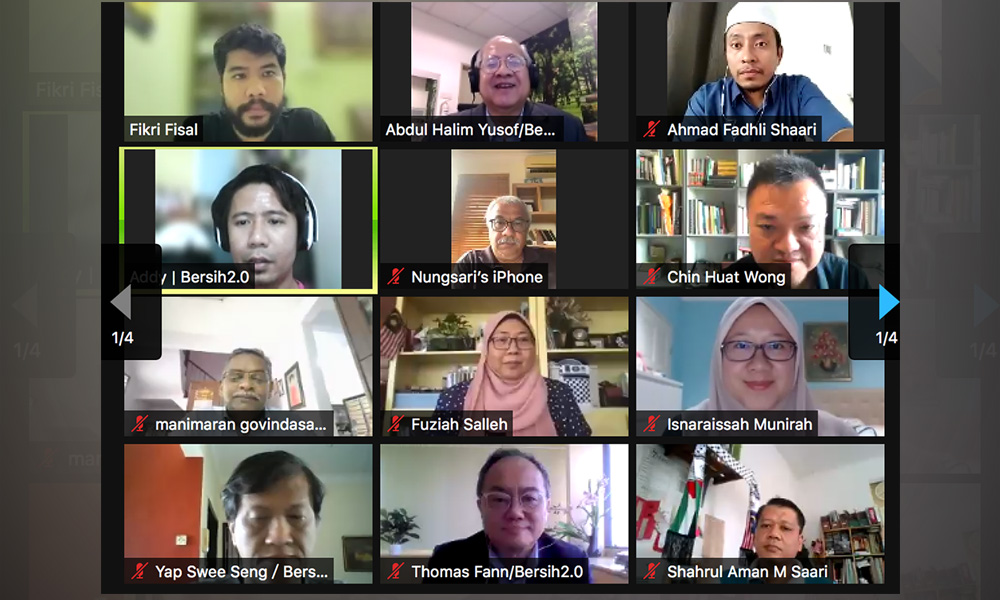Despite being a political appointee himself, Pasir Mas MP Ahmad Fadhli Shaari disagrees with letting politicians head government agencies or government-linked companies (GLCs).
He said he was prepared to resign from being the chairperson of the Skills Development Fund Corporation (PTPK) if the position could be promised to someone from his party, PAS.
PTPK is a statutory body under the Human Resources Ministry that distributes loans for accredited training courses.
This morning, Fadhli (above) was the only government MP in a forum by NGO Bersih on reforming how GLC, government-linked investment company (GLIC) and statutory body directors are appointed.
Speaking in his personal capacity, he agreed on principle with letting qualified technocrats run such firms, not politicians.
“In my personal opinion, I hope that this practice can be fixed from now on.
“We need to fix it so that we only appoint those who are truly qualified, have the experience and can be trusted to lead GLCs,” he said.

Fadhli also opposed allowing the prime minister unilateral power to make such appointments.
“Oftentimes, these appointments are decided by the prime minister in his ‘absolute power’. To me, this needs to be fixed from now on,” he said.
Prepared to resign
In his case, Fadhli admitted it was “unhealthy” for him to lead PTPK.
He has held the position since April 2020, one month after the Sheraton Move mounted a coup and Perikatan Nasional (PN) came into power.
“I am prepared to let go of my position at any time.
“But if I do resign, this is on condition that the person who takes my place is a PAS MP (or) someone whom PAS gets to decide, so that party policies can be continued,” he remarked.
Fadhli stressed it was important for PAS to hold on to the position so that it could implement its policies.
Appointments for support?
PN has been criticised for replacing technocrats with supportive MPs at numerous GLCs, government agencies and statutory bodies.
While Fadhli recognised that political realities - such as the government's razor-thin majority in Parliament - was a factor, he stopped short of admitting that political appointments had been used as umpan (bait).
“Today’s government was not formed on a solid political basis. It was formed through an agreement that arose during unexpected mid-term political turmoil.
“We clashed at the beginning of the term during the general election. PAS clashed with Umno and Bersatu. But we arrived at an understanding at the middle of the term. This understanding is a longgar (loose) understanding,” he said.
“It is not right to say GLC positions were used as bait for support. But I can’t deny it completely either because that is what the public see it to be,” he added.
That said, Fadhli “assured” that PAS backbenchers like him would not have withdrawn their support from PN even if they were not given positions.

Elaborating, the politician admitted that PAS had fallen short of its ideals after becoming a ruling party.
“Today I see that my party is rather stuck with what is being implemented by the government of the day (compared to) our manifesto and what we said during the last general election.
“As we all know, the government was formed with a very thin majority.
“There are many things that we want to do but we can’t. Just like Pakatan Harapan, when it was in government it could not implement many of the things it wanted to because it was stuck with (the former government’s) policies,” he added.
Aside from Fadhli, today’s bipartisan forum featured PKR Kuantan MP Fuziah Salleh, Warisan Kota Belud MP Isnaraissah Munirah Majilis and economist Nungsari Ahmad Radhi.
They discussed the findings and recommendations of the latest report commissioned by Bersih entitled "Reforming the Appointment Process of Directors in GLICs, GLCs and Commercially Related Statutory Bodies”.
Written by Ahmad Fikri Faisal and produced in partnership with think tank Ideas, it proposed a new law to govern how GLC appointments were made, prohibiting elected representatives from GLC directorships except in rare exceptions and using parliamentary select committees to vet GLC director nominees.
The report also suggested full public disclosure of GLC appointment guidelines and gradual removal of "golden shares". - Mkini



No comments:
Post a Comment
Note: Only a member of this blog may post a comment.